A Kandivli restaurateur spent six months hunting rural Maharashtra to learn how to make the perfect thalipeeth
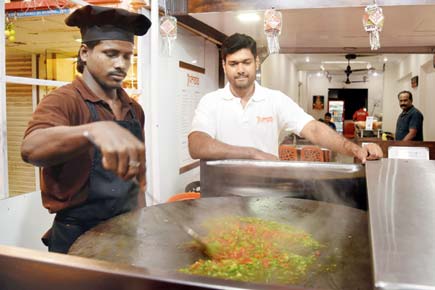
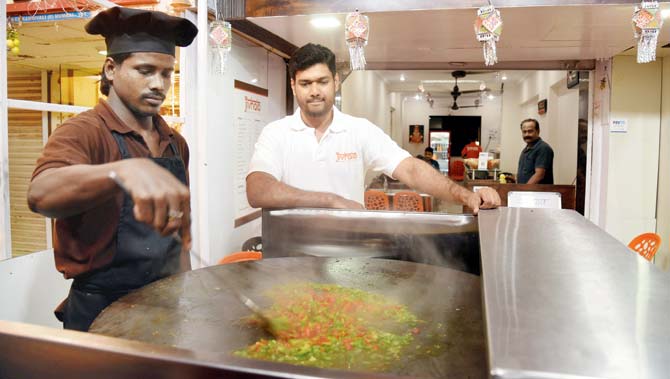
Shardul Yeole has trained his North Indian staff to prepare Maharashtrian delicacies at his eatery. Pics/Nimesh Dave
ADVERTISEMENT
FOR as long as he can remember, Shardul Yeole has had a weak spot for thalipeeth, but a fastidious one at that. The traditional Maharastrian multigrain flat bread, made with a blend of various grains powdered together, and spiked with onions and chillies, is known to be a powerhouse of nutrition. "I would order it at restaurants, but was never happy with the quality, which I felt was either lacking in taste or texture. Having tried the thaalipeeth from Solapur and Nashik in the past, I knew the original taste of the dish was different," says Yeole. What intensified his search for the perfect thaalipeeth were the ubiquitous fast food joints around his Kandivli residence. "There were plenty of places serving burgers and pizzas, but none that served authentic Maharashtrian cuisine in the distant western suburbs," says the 30-year-old whose father, a police officer owned a restaurant in Dahisar 15 years ago. "Back then, we had to shut shop due to operational problems, but I retained the desire to run a restaurant," says Yeole, who earned a hotel management degree from Rizvi college in 2007, but later ended up starting his own venture in construction. While managing his ongoing project in Satara district, he runs the restaurant with help from his brother Ruturaj and mother Lalita.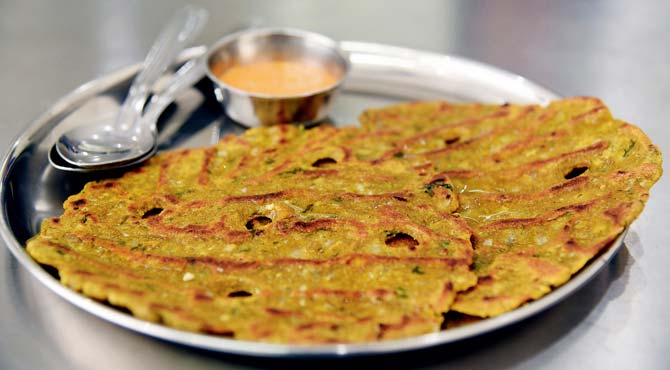
The thalipeeth is priced at Rs80
Today, on a busy road near Avenue Hotel in Kandivli East, stands Jivhala — The Maharashtrian Kitchen, Yeole’s labour of love. The modest 26-seater eatery is dotted with bright orange chairs that stand in contrast to the freshly painted white walls. Less than a month old, the menu currently has 26 items on the list, which Yeole plans to expand to 82 in the next 3 months.
Interestingly, almost every dish has a story behind it. "For six months, I toured several villages and towns in Maharashtra right from Pune, Satara, Bhigwan, Lonavala, Kolhapur and Solapur to understand the traditional way of making Maharashtrian dishes," he tells us when we meet him on a Tuesday evening.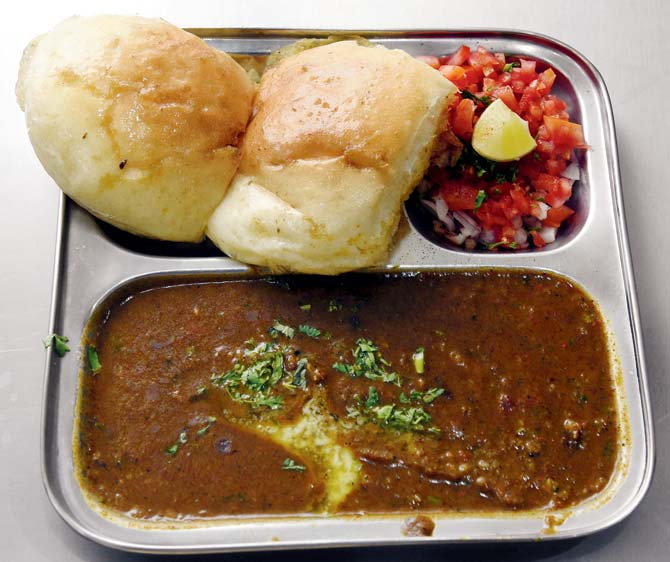
The Kaali pav bhaji is priced at Rs100
The recipe for the bharli vangi (stuffed brinjal) for instance, came from a roadside eatery in Solapur. "In April this year, while driving to Karmala, a village in Solapur, my mother and I stopped at a makeshift stall run by a villager named Vijay Patil and ordered the dish. The dish was tasty, and I’ve realised that the water used also makes a difference," he says. A friendly conversation with the owner revealed that what set this dish apart from what’s found in Mumbai menus was the kanda khobra masala made with dry coconut paste and the special Solapuri masala made with coriander, cumin, chilly, fenugreek, tamarind, turmeric, asafetida and Bengal gram. "He didn’t share the recipe, though. Not everyone is open to sharing recipes of their signature dishes, so sometimes people would refuse. It was left to us to figure what masala went into the dish," he says. Most of the dishes, including the kharwas, a Maharashtrian dessert made from cow’s milk and patwadi, savoury besan bites which are served as a side dish or can be had with dipped in curry, were items whose recipe they improvised themselves.
While the recipe for the bhazniche thalipeeth, came from his mom’s kitchen, the technique was learnt during his travels. Bhazni is the term used for dry roasted multi grain flour. "In Mumbai, they mostly use two or three types of grains and deep fry the thalipeeth because it’s faster and cost effective. We use nine types of grains — among which are millet, rice, split bengal gram, sorghum (gluten-free grain), split black gram and a hint of coriander seeds. We roast one side of the thaali peeth, while the other is steamed," he says, explaining why the dish here would cost you Rs 80, while elsewhere the average price is Rs 40. The pancakes, he adds, have to be flattened out by hand. "It’s nutritious and can be tweaked using your imagination. For instance, you can add methi, palak and even vegetables to it." It usually takes Yeole an entire day to prepare 8 to 10 kg of bhazni for the thalipeeth.However, not all his visits to the Tier II towns and villages proved successful.
The shengdanyachi (groundnut) chutney, for instance, is something that didn’t match up to his expectations even in the rural areas, which is when he resorted to his own recipe. "The chutney we tasted in the villages had no garlic, and had a greasy texture due to the oil. At Jivhala, we use no oil in the chutney." he says. During his post graduate days at Bandra’s Chetana college, Yeole recalls being the go-to guy for the chutney. "I would prepare it at home and take it for my friends, who would have it with roti or khakra. My mother still asks me to prepare it for her whenever I am free," he smiles. From the 500 gms that he would prepare a decade ago, today he makes an average of 15 kg every week. Made using roasted peanuts, cloves of garlic, cumin seeds and red chilli powder, the chutney, even has a hint of sweetness, which makes it addictive.
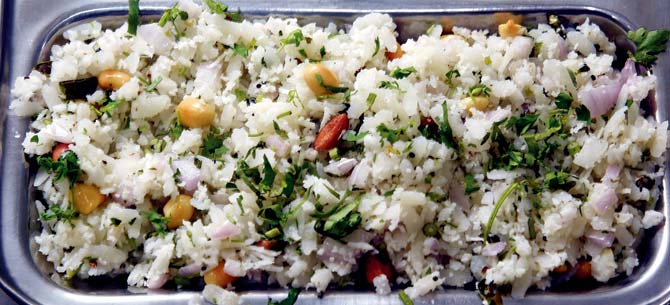
No Maharashtrian eatery can be complete without missal pav. "The dark, reddish brown gravy is made of five different masalas. While we prepare the goda masala, the kanda masala and lal masala comes from Solapur," he says. The missal is extremely spicy, and not for those with weak palates. And for those of who can’t handle the spice levels, Yeole has the Dadpe pohe, a recipe his mother discovered 25 years ago. Made with a thin variety of flattened rice and copious amounts of grated coconut, the unique part about the dish is that there’s no ‘cooking’ involved. "All you need to do is make the tempering of mustard and cumin seeds, curry leaves, asafetida and add it to the poha. Squeeze a lot of lime in it," he says. The dish, which looks like a regular plate of poha, is far from similar in taste. It’s moist due to grated cocconut and is devoid of spice, unlike most Maharashtrian items.
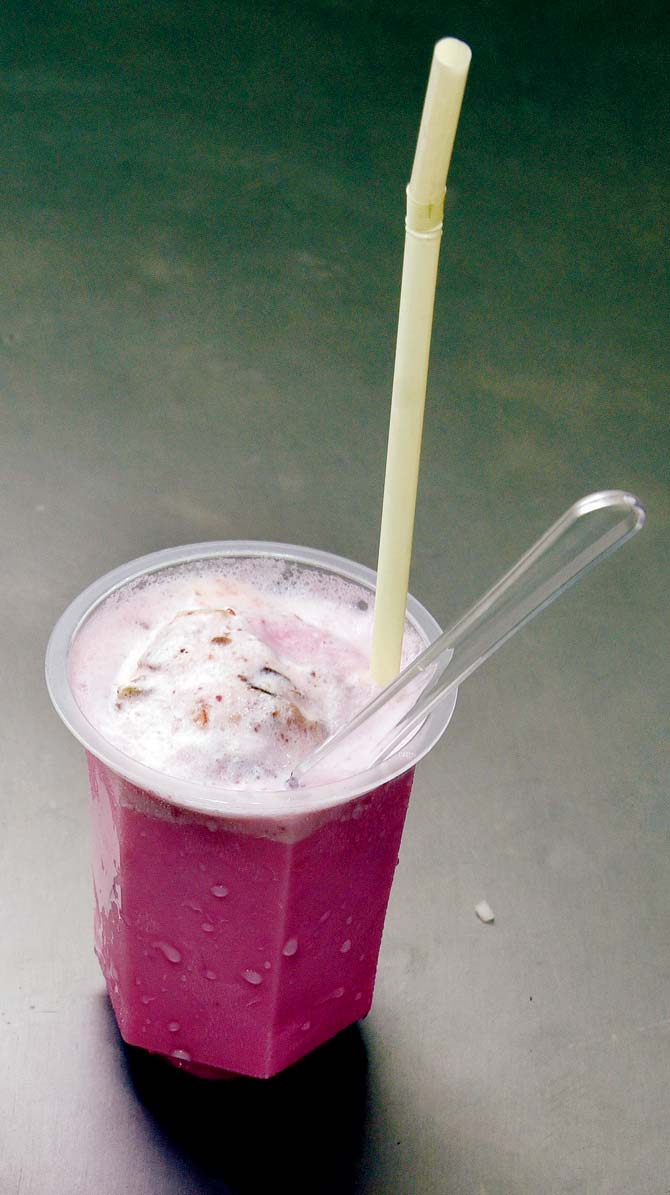
A rose-flavoured Mastani is a famous Maharashtrian dessert drink priced between Rs75 and Rs200
Yeole, however, has kept the surprise dish for the last – the Black Pav Bhaji which is similar to Maruti Pav Bhaji, Vile Parle’s best kept secret (well, not anymore). His main ingredient is butter and black pepper and this is what lends the black colour to his Bhaji. "I love their pav bhaji. People appear apprehensive when they see it because of the colour, but once they taste it, they love it."
 Subscribe today by clicking the link and stay updated with the latest news!" Click here!
Subscribe today by clicking the link and stay updated with the latest news!" Click here!






